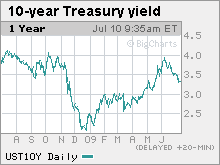Treasurys rally on recovery woes
Investors look for safety as consumer confidence sags and at the end of a week with $73 billion in auctions.
NEW YORK (Reuters) -- U.S. Treasury debt prices rallied Friday after a survey showed renewed consumer worries, intensifying doubts about a speedy economic recovery.
Investors also jumped back into Treasurys on stock market weakness and relief that the market digested this week's $73 billion in long-dated supply without much of a hitch, analysts said.
"The recession hasn't really bottomed out," said Anne Ruff, a portfolio manager with Rydex Investments in Rockville, Maryland. "The bond market should continue to rally."
Reuters and the University of Michigan said Friday their survey's overall index of consumer sentiment in early July declined to 64.6, falling short of analysts' forecast of 70.5. It finished at 70.8 in June.
Economists monitor this barometer as a proxy of future consumer spending, which makes up about 70% of the U.S. economy.
In addition to the sentiments survey, a profit warning from Chevron Corp (CVX, Fortune 500) signaled the U.S. economy's struggle and pushed the stock market lower.
The price on benchmark 10-year Treasury notes was up 1 point at 98-19/32, reversing Thursday's loss. The yield, which moves inversely to the price, was 3.29%, down from 3.41% Thursday.
The 10-year note yield briefly touched a seven-week low of 3.28% set on Wednesday and was on track for a third straight week of declines --something that has not happened since December.
The Dow Jones industrial average and Standard & Poor's 500 index were each down 0.9%, while the Nasdaq composite was 0.5% lower.
Not all the economic news on Friday was bleak.
Government data showed a surprise shrinkage in the U.S. trade gap in May and bigger-than-expected increases in export and import prices. The reports suggest some stabilization on the global trade front, but the moves are too meager to stem further contraction of major economies, analysts said.
The trade deficit shrank to $25.96 billion in May, the smallest since November 1999, while U.S. import prices jumped 3.2% in June, the largest single-month rise since November.
The absence of long-dated supply next week could add to Friday's gains, said John Schatz, an interest rate strategist with Banc of America Securities Merrill Lynch in New York.
"It's obviously a short-term positive," Schatz said.
But he cautioned the supply factor remains a long-term negative for Treasurys due to the hefty $2 trillion in new debt the Treasury Department will issue this fiscal year to finance the burgeoning federal deficit. ![]()



